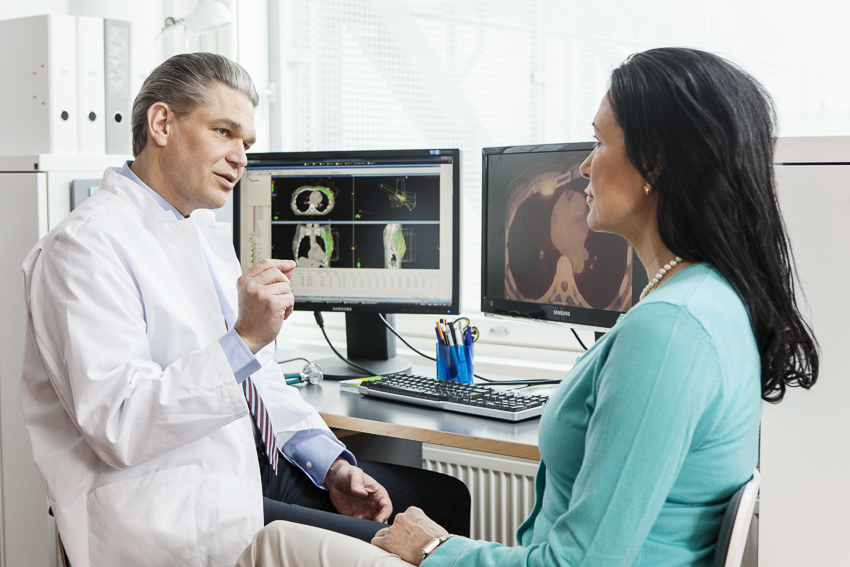The temporary technical problem in the data network connections
A temporary technical problem occurred in the data network connections of Docrates Cancer Center. We apologise for any delays caused...
Read moreMon–Fri 8–16

Several factors may affect the prognosis of breast cancer. More advanced treatment options become available, whereupon the prognosis of breast cancer is constantly improving. Approximately nine out of every ten patients will be alive five years after diagnosis, and the majority of them have been cured of their cancer completely.
The choice between treatment options as well as the patient’s prognosis depend on the stage of cancer. The risk for recurrence in breast cancer can be evaluated on the basis of certain prognostic factors. The most important factor increasing the risk of recurrence is the presence of axillary lymph node metastases.
After breast cancer surgery, a pathologist examines the removed malignant tumour thoroughly and determines the precise type of cancer involved. In terms of breast cancer recurrence and the choice of follow-up treatment, significant factors include the gradus of the tumour, the expression of hormone receptors on the cell surface, the cell proliferation rate and the potential expression of HER-2. Another significant factor increasing the risk for recurrence is the young age of the patient.
Sometimes a breast cancer can recur locally. The majority of recurrences occur within five years, but it is also possible that a breast cancer can recur even decades after its initial diagnosis. If a breast cancer recurs locally, the aim of the treatment is always total recovery. If the breast cancer has spread, several effective forms of treatment are available. However, today metastatic breast cancer cannot usually be cured yet.
Breast cancer can be divided into three categories according to the grade of differentiation or malignancy (gradus 1-3). The more a cell is differentiated, the more it looks like normal cells and the slower it grows or spreads. Gradus 1 means that the breast cancer has a good prognosis, while gradus 3 means that the cancer has the poorest possible prognosis. The gradus classification is used when the need for post-surgery medical treatments is evaluated. More information about the gradus classification of breast cancer is available on the website of Cancer Society of Finland.
At Docrates Cancer Center, the patient always meets her personal doctor at individually scheduled follow-up appointments. A person who has received treatment for breast cancer will have to undergo mammography, complemented with ultrasound imaging or in special cases MRI at least every two years. Further examinations are available without delay, should you experience any symptoms or concerns that require further assessment after your treatments.
In order to maintain an optimal quality of life, a holistic approach addressing all aspects of the cancer patient’s health and well-being is essential. The Health and Recovery Center at Docrates Cancer Center provides top experts who are thoroughly familiar with the treatment of cancer patients. An expert in cancer recovery can help the patient to draw up a recovery plan that meets her individual needs. Recovery from breast cancer is typically supported with manual lymph drainage therapy, sexual therapy and medical nutrition therapy.
A temporary technical problem occurred in the data network connections of Docrates Cancer Center. We apologise for any delays caused...
Read more
Hannu Nurmio was aware that prostate cancer is the most common cancer in older men. However, after the diagnosis was confirmed,...

Early detection of colorectal cancer is crucial for successful treatment. If diagnosed early, up to 90% of cancers can be...

Docrates Cancer Center is the first service provider in the Nordic region to launch a new experimental alpha radiation treatment...
Contact us!
Mon-Thu 8:00-18:00, Fri 8:00-16:00
